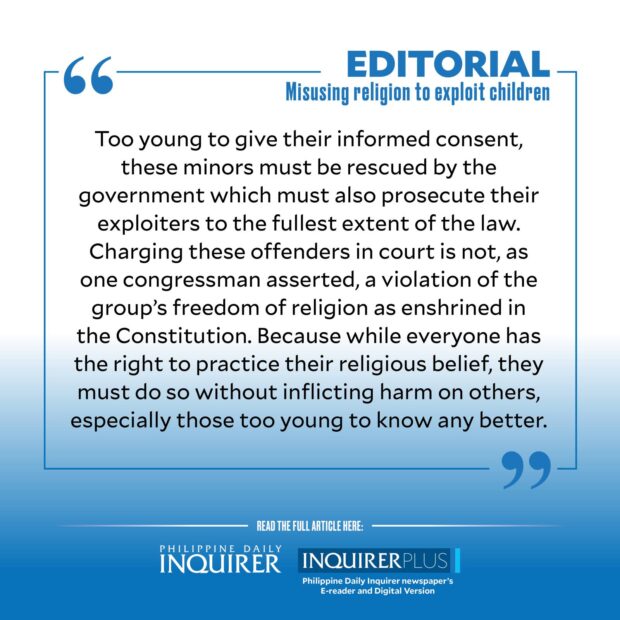
Hardly has Congress finished its probe into the reported religious cult Socorro Bayanihan Services Inc. (SBSI) when a TV news report disclosed that another group given similar permission to occupy a protected forest area has formed its own government.
As reported by ANC, law enforcement authorities and representatives from the Department of Environment and Natural Resources (DENR) last week checked on a self-proclaimed indigenous tribe in Surigao del Norte that has its own government, justice system, and currency. Like the SBSI, Maharlika Nation was granted a Protected Area Community-Based Resource Management Agreement (PACBRMA) by the DENR that allowed its more than 1,000 members to live in almost 400 hectares of mountain land. An official of the group said they are part of indigenous peoples (IPs) who have lived in the area “since time immemorial” and thus did not need to register with the National Commission on Indigenous Peoples (NCIP), despite this being a requirement when applying for the land grant. The Maharlika Nation’s 25-year PACBRMA expires in 2029.
The existence of the self-governing group was uncovered shortly after SBSI came under scrutiny for its alleged child marriages and other coercive practices. That both controversial groups have flourished under the radar into fully-functioning jurisdictions raises questions on how competently the DENR pursues its stewardship role over the country’s natural resources. How strictly does it vet PACBRMA applicants who are expected to take over the effective and responsible management of forest lands to include their “protection, preservation, conservation, development, [and] rehabilitation”? Having entrusted vast tracks to land to presumably qualified organizations, how diligently does the DENR monitor their activities and compliance with conditions of the agreement? Does it even have the resources to do this regularly, given the often remote locations of these land grants?
The accountability of the NCIP over the country’s countless IP groups becomes an issue as well, as shown by the Maharlika Nation openly flouting its nonregistered status. It may be time for the commission to reassess its resources and capability to exercise its expansive mandate, just as the national government should review its leadership and structure to enable this little-visible office to do a better job.
So far, DENR Secretary Antonia Yulo-Loyzaga has ordered the suspension of the SBSI’s land grant pending investigation of its alleged violations of the agreement’s terms and conditions. The agency said it started investigating the group as early as 2019 for the violations including restricted entry to the area, establishment of checkpoints, and military-like training of its members. A DENR undersecretary also revealed that most of the SBSI’s almost 3,500 members are illegally occupying the 353-ha protected forest area in Socorro town, Surigao del Norte, since they are not among the “tenured” beneficiaries or original settlers under the land deal with the group. The Commission on Human Rights (CHR) meanwhile said its investigation on the hillside community showed “violation of [the children’s] right to access education and [of] the freedom of movement of these people.”
All these infractions, however, do not approximate the gravity and criminal nature of the alleged rape of children in the group’s practice of forced marriages among minors, that the CHR had uncovered after interviewing young members of the alleged cult. In a Senate hearing, several witnesses also testified that members as young as 14 were forced to marry and have sex with men that their leader, Jey Rence “Senior Agila” Quilario, had chosen for them.
Justice Secretary Jesus Crispin Remulla disclosed that at least 19 girls and three boys were forced into common-law marriages by SBSI leaders. A former member claimed that when minors are chosen to be married, SBSI leaders would use the parents to convince their children to do as they are told, for their “messiah” Quilario and “to be saved from hell.” Children who rebel against the arrangement would be made to stay at Quilario’s house where leaders would encourage them to sleep with their “messiah,” the former member added.
Such claims were confirmed by a Department of Social Welfare and Development (DSWD) record of 21 cases of child marriages in the SBSI community, following an initial profiling by its social workers. Too young to give their informed consent, these minors must be rescued by the government which must also prosecute their exploiters to the fullest extent of the law.
Charging these offenders in court is not, as one congressman asserted, a violation of the group’s freedom of religion as enshrined in the Constitution. Because while everyone has the right to practice their religious belief, they must do so without inflicting harm on others, especially those too young to know any better.